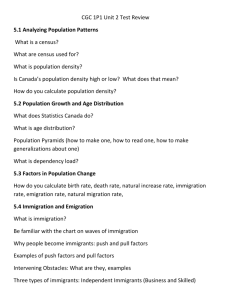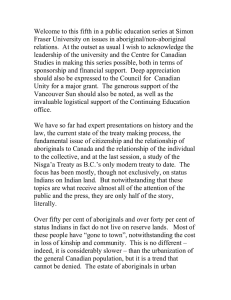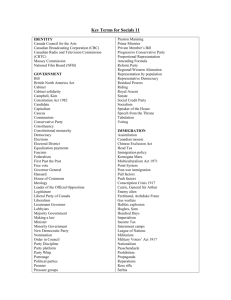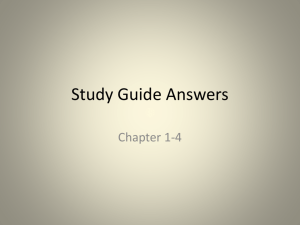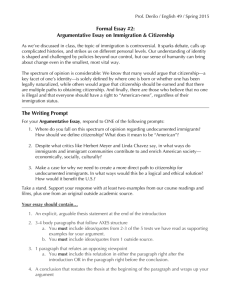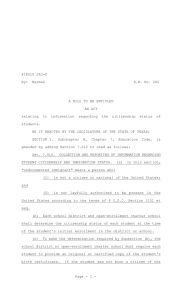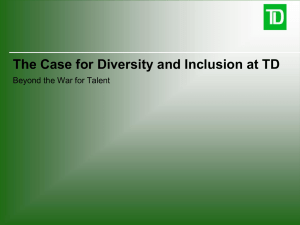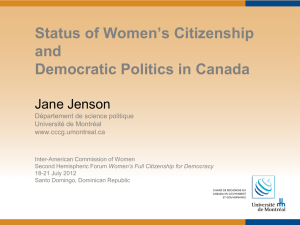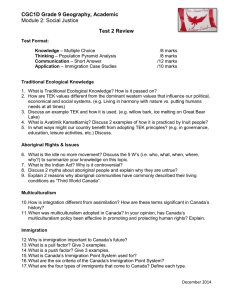Chapter 2: How do you Define Citizenship
advertisement
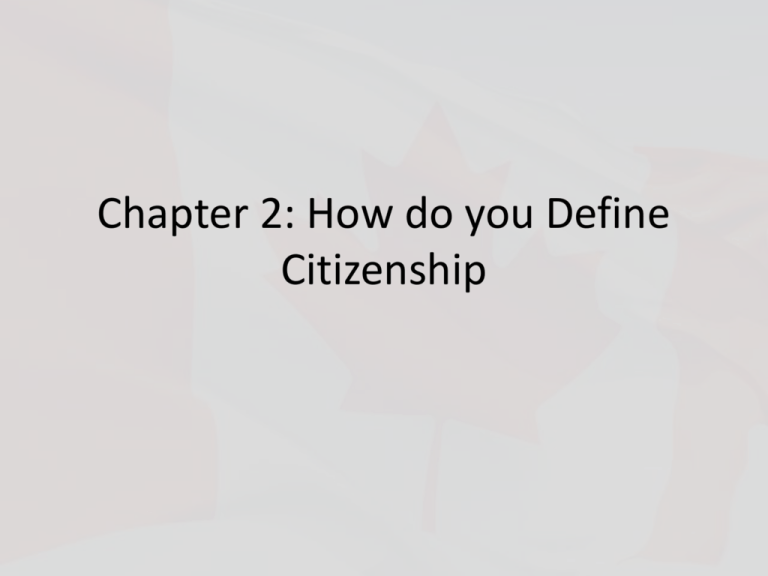
Chapter 2: How do you Define Citizenship Introduction • Think about what it means to be Canadian – We’re talking our rights, our responsibilities, our customs, values, etc... • So how do you define a Canadian? • Canada is a “Salad Bowl” nation rather than a “Melting Pot”. – Is this good or bad... Think about it! Citizenship and the Aboriginal Peoples of Canada Who Were the Aboriginal Peoples? • Three distinct groups... – First Nations, Inuit, and Metis • They are mostly the same as everyone else, but they have a special right to “SelfGovernment” – They get to control their health, education, housing, etc. – They have been treated poorly by the Canadian Government in the past • forced out of land • Had the “Indian Act” of 1876 that banned ancient practices Organization and Assimilation... (Hey Look! Isms!) • Canada tried to “Assimilate” the natives – We had residential schools that took kids away from their families – 100,000 kids attended these schools – Eventually it was decided that this was wrong and “survivors” were given 1.9 billion dollars as a settlement. • Aboriginals have become increasingly politically active over the last century – Formed the National Indian Brotherhood in 1968 – Assembly of First Nations which still exists today and serves as a voice in Ottawa • Many argue that Aboriginals do not share equally in Canada’s prosperity... What do you think?... (This is a thorny issue!) – Canada is ranked very high on the HDI but aboriginals in Canada continue to rank very low (life expectancy, education, income) Two European Founders • Brief History Reminders... – First European to arrive in Canada was Jacques Cartier in 1534 (from France) – France established the first Colony in Acadia – In 1759 they were defeated by the British and Canada became a British Colony – To make friends with the French, the British let them keep their language and religeon – In 1867 the British North America Act creates a unified Canada and formally recognizes French-Language Rights – Lots of talk about Separation... The FLQ and the PQ... Pierre Trudeau passes the Official Languages Act in 1969 – Section 23 of the Canadian Charter of Rights and Freedoms says parents have the right to have their children educated in their language... Even if they are the minority • The British – Following the American Revolution many British move north to stay British Citizens – United Empire Loyalists – over 40000! – So many that Canada became a predominantly English Nation – Many Scottish people move to the eastern areas as well– Nova Scotia (New Scotland) – Lots of Irish people cross as well– Escaped mass starvation in Ireland Canadian Immigration • Immigration has changed in Canada to a drastic degree over the last 150 years. – Originally Canada only wanted White people– like Ukrainians, Scandinavians, Americans... – Eventually they let 15,000 Chinese in, but only to work on the Railroads (they were not allowed citizenship) – Only 400 Japanese were allowed in per year! – A head tax needed to be paid on every Chinese person who entered – 50$ a person • Until 1947 there was no such thing as “citizenship”. You were considered “subjects of the British Empire living in Canada”. • By 1960 immigration policy began to change– prejudice was slowly fading so that people were judged less on just the colour of their skin or ethnicity. • The “Points System” is developed in 1976 where you are allowed in based on your understanding of our Languages, level of education, and job skills • Recently, as a result, the primary sources of immigration have changed from Europe to Africa and Asia – In 1960 only 3.2% of our immigrants came from Asia. Today over 58% are! How could this change the character of our nation? • We also are one of the world’s largest refugeereceiving nations Citizenship and Multiculturalism • Canada is the first nation in the world to adopt Multiculturalism as an official policy – This allows immigrants to keep their own language, heritage, and identity when they move here (keeps them from being assimilated) • This policy helps us the value diversity as a people instead of just accepting it – – – – Human Rights Day National Aboriginal Day Black History Month Asian Heritage Month For Journal Entry Review the “Immigration: Open Borders or Lockdown?” article on page 42 • Read and critically examine questions 1-3 • Answer questions 1-3 • Be sure that you have at least 1 paragraph (4-5 sentences at least) to make your points • Be sure that your paragraphs are organized properly (topic sentence, example, explain, concluding sentence)
